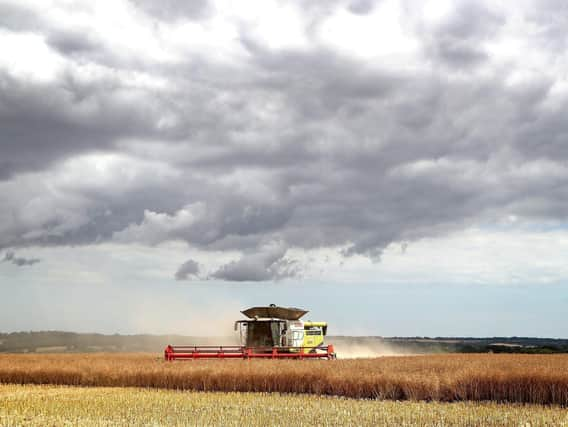Change of rules in food crop gene editing could help tackle some of the biggest challenges around food and climate change Government claims


Gene editing makes changes to the traits within a species of plant or animal much more quickly and precisely than traditional selective breeding which has been used for centuries to create stronger, healthier crops and livestock.
Officials and scientists have drawn a distinction between gene editing, which involves the manipulation of genes within a single species or genus, and genetic modification (GM), in which DNA from one species is introduced to a different one.
Advertisement
Hide AdAdvertisement
Hide AdBut following an EU ruling in 2018, it is regulated in the same stringent way as GM organisms, a situation which Environment Secretary George Eustice said could be changed now the UK has left the EU.
“Gene editing has the ability to harness the genetic resources that nature has provided,” Mr Eustice said.
“It is a tool that could help us in order to tackle some of the biggest challenges that we face – around food security, climate change and biodiversity loss.
“Outside the EU, we are able to foster innovation to help grow plants that are stronger and more resilient to climate change. We will be working closely with farming and environmental groups to ensure that the right rules are in place.”
Advertisement
Hide AdAdvertisement
Hide AdThe announcement was described as “encouraging” by NFU vice president, Tom Bradshaw.
“It is very encouraging to see the Government’s view that new precision breeding techniques, such as gene editing, have the potential to offer huge benefits to UK farming, the environment
and the public, and will be vital in helping us achieve our climate change net zero ambition,” Mr Bradshaw said.
“The world’s climate emergency points to the urgency of applying this technology to farming and this announcement is an important first step towards a properly functioning legislative system.”
Advertisement
Hide AdAdvertisement
Hide AdIn a response to a consultation on the issue, the Government said that, as a first step, it will change the rules relating to research and development of plants using gene editing, to align them with plants developed using traditional breeding methods.
Scientists will still be required to notify the Environment Department (Defra) of any research trials they are conducting involving gene editing plants.
This has been welcomed by crop science organisation National Institute of Agricultural Botany (NIAB) which, it said, marked an “important step” towards more “proportionate and enabling regulation” of these technologies.
“Innovation in plant breeding will be the single most important factor in helping global food supplies keep pace with a growing world population in the face of climate change and pressure on finite natural resources of land, water, energy and biodiversity,” said NIAB chief executive, Dr Tina Barsby.
Advertisement
Hide AdAdvertisement
Hide AdThe next step, the Government said, would be to review the regulatory definitions of a genetically modified organism, to exclude organisms produced by gene editing where it could have been achieved more slowly by traditional breeding methods.
Prof Robin May, the Food Standards Agency’s chief scientific adviser, said: “We support giving consumers choice and recognise the potential benefits that gene edited plants and animals may bring to the food system.”
Many green groups remain opposed to the creation of new, gene-edited breeds of pigs, cows and poultry arguing that so-called Frankenfoods will only worsen the intensification of factory farming.
Rare Breeds Survival Trust chief executive, Christopher Price, said: “Plans to enable gene editing for food production must not apply to livestock. Rather than looking to gene editing livestock in laboratories to enable an increasingly intensive future for UK farming, Government should instead be facilitating the use of our native livestock breeds in extensive systems.”
Comment Guidelines
National World encourages reader discussion on our stories. User feedback, insights and back-and-forth exchanges add a rich layer of context to reporting. Please review our Community Guidelines before commenting.